Books

The Align Method · Aaron Alexander
Read on July 2022 • How strongly I recommend it: 8/10 • Buy on Amazon
A comprehensive look on how to regain vitality and get back in touch with our bodies through movement. Like an instructions manual for the human body. Emphasizes how detrimental our current sedentary lifestyles are and how irremediably they lead to numbness and physical pain. Aaron manages to offer accessible, scientifically-rigorous advice on how to gain strenght, flexibility and balance—all while exploring the two-way relationship between body and mind and being quite amusing in the process.
It helped me get clear on why I want to live by these principles, and also become more aware of the way I inhabit my body. As biological beings, our bodies are inherently wise, and learning to listen to them is the first step towards unlocking our highest potential. Training is something you do 24/7, rather than a few hours every week at the gym (if any). The seemingly small actions and mundane movements we perform every day have the potential to either increase the chances of illness or pave the way to long-term well-being. We get to choose every day. Your move.
“You’ll likely catch yourself mouth breathing around the same time that you start to realize that you’re focusing on the result more than the process itself.”

Nobody wants to read your sh*t · Steven Pressfield
Read on April 2022 • How strongly I recommend it: 7/10 • Buy on Amazon
About the power of storytelling. Really engaging book, I read it cover to cover in one sitting. I first heard about it in a conversation between David Perell and Morgan Housel. Steven knows a thing or two about writing, with a vast experience working in advertising, screenwriting, novels, non-fiction, etc.
When you understand that nobody gives a damn about your writing, you develop empathy. If the readers don’t find value in your writing, it’ll take them five seconds to find something more entertaining. Reading / writing is a transaction: the writer offers value and the readers invest their time and attention. To keep readers hooked, use the hero’s journey + a three-act structure (hook, build, payoff). These structures are hard-wired into our psyches and encapsulate many of the principles of storytelling—don’t go against them just because they seem formulaic.
“When you get to a sex scene, don’t let the story come to a screeching halt while we watch two people bang each other. Make the screwing scene advance the story.”

Show your work · Austin Kleon
Read on March 2022 · How strongly I recommend it: 7/10 · Buy on Amazon
Short actionable book about sharing your work online. These days, if your work isn’t online, it doesn’t exist. Share things that might be helpful, or entertaining. Anything goes: pictures or your butt your work, your ideas, what you’re learning, etc. Valuable advice that, as of March 2022, I still struggle to follow.
One powerful concept by Robin Sloan: Stock & Flow. When applied to content strategy, the stock is the durable stuff: content that’s as interesting in two years as it is today. Conversely, the flow is the feed: the posts and the tweets that remind people you exist. The magic formula is to maintain your flow while working on your stock in the background.
“You can move from mediocre to good in increments. The real gap is between doing nothing and doing something.”
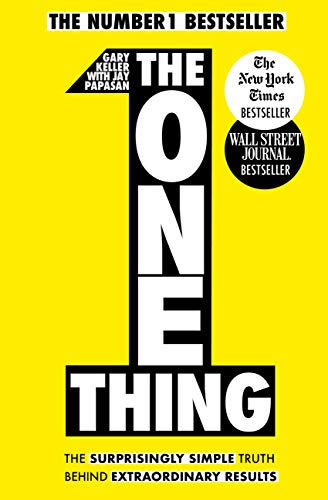
The ONE Thing · Gary Keller & Jay Papasan
Read on March 2022 · How strongly I recommend it: 7/10 · Get on Amazon
Good advice on how to develop a focused mindset that leads to productivity and results. What’s the ONE Thing you can do such that by doing it everything else would be easier or unnecessary? It felt a bit preachy at times, but it covers I got dozens of valuable insights out of it: on thinking big and acting small, tying long-term direction with short-term actions, applying the 80/20 rule, saying no, asking good questions, developing habits, using mental models, developing a growth mindset, delaying gratification, designing your environment, leveraging compound effect, etc.
“If you chase two rabbits, you will not catch either one.”

Lifespan · David Sinclair
Read on March 2022 · How strongly I recommend it: 9/10 · Buy on Amazon
I like to say, only half-jokingly, that I might live a few extra decades just because of this book. If there are any other books that can provide you with that much upside, please share them with me. If you are not aware of the latest developments in longevity, David Sinclair’s work should be a good introduction. This book it’s no easy read though—it’s scientifically rigorous and David’s writing can get very advanced. But he accomplishes to make the subject approachable through his storytelling and reflections about what this means both in philosophical and practical terms. With such a big breakthrough, society still has a hard time conceiving this new scenario, but that won’t prevent it from happening. Things you can do: eat less often (mostly protein and fat), exercise more (less cardio), get cold exposure, reduce stress levels, sleep well, don’t do drugs, take supplements when you’ve done all the rest.
“I believe that aging is a disease. I believe it is treatable. I believe we can treat it within our lifetimes. And in doing so, I believe, everything we know about human health will be fundamentally changed.”
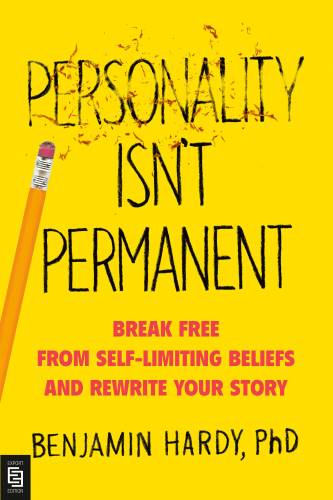
Personality Isn’t Permanent · Benjamin Hardy
Read on February 2022 · How strongly I recommend it: 7/10 · Buy on Amazon
Don’t be fooled: most personality tests are junk science. This book came about as a result of one of them, when the author almost didn’t marry his wife because a flawed test said they weren’t compatible. I was expecting to learn more about the Big Five (the only personality test with scientific validity), but the author does little more than acknowledge its existence. I was also slightly put off by the writing, I found the author relied too much on quotes. Despite all that, this book offers plenty of healthy advice if you are struggling to break free from the past and become the person you want to be. I caught myself taking dozens of notes about trauma, identity, self-narrative, fixed vs growth mindset, environment design, or the power of the subconscious mind.
“A clear indicator that someone has unresolved trauma is that his life and personality are repetitive for an extended period.”
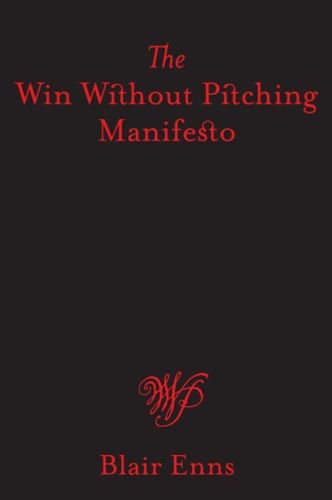
The Win Without Pitching Manifesto · Blair Enns
Read on February 2022 · How strongly I recommend it: 9/10 · Buy on Amazon
A must-read for any freelancer or creative firm. Short and sweet. As someone who isn’t fond of traditional selling, the idea of “not pitching” was very appealing to me. It was after several conversations between the author and Chris Do that I decided to read the book, and… it blew my mind. It’s so good. The book is written in a timeless, almost religion-like fashion, broken down into twelve “proclamations” to abide by. If you are a service provider (e.g. consulting, design, software development, writing, etc.), this book has the potential to transform the way you do business. I’m so glad I came across this book early in my career.
“When we express our resentment for the client who does not value us, we are really expressing our self-loathing for not being able to walk away from him.”

Why are we yelling? · Buster Benson
Read on February 2022 · How strongly I recommend it: 8/10 · Buy on Amazon
On how to navigate disagreements productively. Due to my temperament, I’ve always had a hard time dealing with conflict, and I was becoming increasingly aware that I needed to do something about it. I love Buster’s work, so when I found he had written about this subject I didn’t hesitate to read it. It’s quite an interesting book, with some frameworks to keep in mind when arguments arise (voice of power, reason, avoidance, possibility / issues of head, heart, hands). It also makes great use of images and humor. Now instead of deflecting arguments, I try to lean into them with curiosity, and push back more often whenever I disagree with something. It’s uncomfortable, but sometimes it’s necessary.
“When you find yourself arguing with your own shadow, you might as well sit down, because it’s going to last a very long time.”
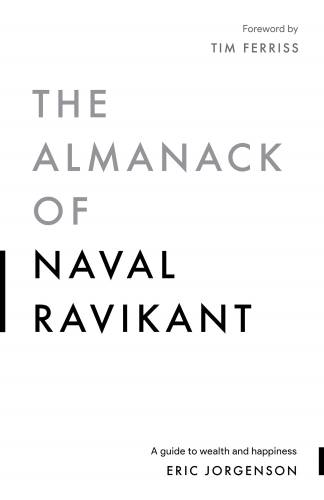
Read on January 2022 · How strongly I recommend it: 9/10 · Get on navalmanack.com
Modern-day philosophy around how to achieve wealth and happiness. Naval’s quite a successful yet reserved guy, with an astonishing clarity of thought that has brought him a massive cult-like following on Twitter. The author tweeted at him asking him whether he would like to have his interventions collected in a book, Naval said yes, so this is how this book came about. Eric has done a great job summarizing all of his writing, interviews, and public appearances into this compact, value-dense book. Almost everything in it is highlight-worthy, so I highlighted nothing with the intention of revisiting the book several times throughout my life. And it’s free—goddamn it—so do yourself a favor, set aside a few quiet hours, and absorb it slowly.
“Desire is a contract that you make with yourself to be unhappy until you get what you want.”

How to live · Derek Sivers
Read on November 2021 · How strongly I recommend it: 7/10 · Buy on sive.rs
A short book that opens with the question “How to live?”, and comes up with 27 different answers to that one question. I thought it would be fun to rate these answers based on how much they resonated with me at the time of reading (from 10 to 8): learning, balance, be free, value only what has endured, fill your senses, pain, avoid death, make 1000 mistakes. Committing to any of these individual strategies is a valid approach to life but, perhaps self-evidently, the gold is to be found in the combination of them. Book inspired by the Sum: Forty Tales from the Afterlives by David Eagleman (which I also tried but left halfway through). I’ve been following Derek for years now, and I’m always delighted by his unconventional thinking and his approach to life. I’ll admit I might have stolen this /books section from him.
“Don’t quote. Put it in your own words without looking up or referencing what others said. If you can’t explain it yourself, you don’t know it.” — Derek Sivers
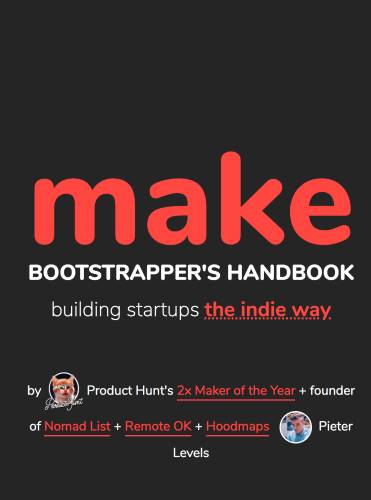
Make · Pieter Levels
Read on February 2021 · How strongly I recommend it: 7/10 · Buy on makebook.io
On how to build a startup, the indie way. There’s little more to say about Pieter Levels, creator of NomadList (follow me), remoteOK, or dozens of other startups. One single guy—and his army of robots—literally shaping the digital nomad, entrepreneurship, and remote work industries. In this book, he distills his whole process of bootstrapping companies in this brave new world: 1. Idea, 2. Build, 3. Launch, 4. Grow, 5. Monetize, 6. Automate, 7. Exit. Beware—the writing is… not good. But the value of the content makes up for it.
“If your ideas aren’t ridiculed they’re probably too basic.“

The courage to be disliked · Ichiro Kishimi & Fumitake Koga
Read on July 2020 · How strongly I recommend it: 6/10 · Buy on Amazon
Philosophical conversations between a master and his apprentice. Based on the school of thought of Alfred Adler, an Austrian contemporary of Freud, Jung and Frankl. Wide-ranging topics like: how there’s no escape from our own subjectivity, how all problems are interpersonal problems, how to build horizontal relationships, how the meaning we attribute to our past determines our present, how contribution is key to happiness, etc. Food for thought in lockdown times. Funnily enough, the apprentice’s ignorance can seem willfully annoying at times, but that’s just how the Socratic method works. Any wise person has to go through that stage of questioning.
“Why are you still unable to change? It is because you are making the persistent decision not to change your lifestyle.”
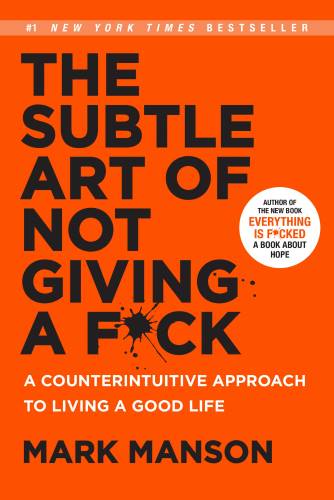
The subtle art of not giving a f*ck · Mark Manson
Read on February 2020 · How strongly I recommend it: 5/10 · Buy on Amazon
Conventional life advice—all the positive and happy self-help stuff we hear all the time—often fixates on what you lack and ends up doing more harm than good. Give a fuck only about what’s truly important, and forget about the rest. Choose your problems. Lower your expectations. Embrace failure. I can’t put my finger on it, but I didn’t get much of this read. Perhaps I didn’t like Mark’s style, I was already familiar with the book’s concepts or my mind was just somewhere else.
“The narrower and rarer the identity you choose for yourself, the more everything will seem to threaten you.”
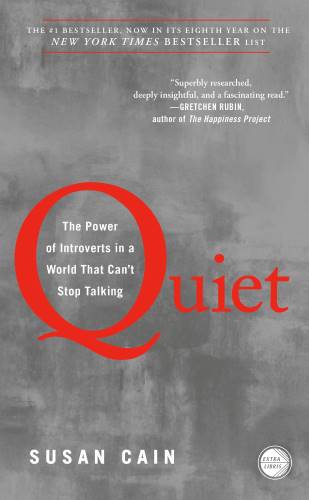
Quiet · Susan Cain
Read on January 2020 · How strongly I recommend it: 9/10 · Buy on Amazon
Whether you’re an introvert yourself or an extrovert who loves or works with one, you’ll benefit from reading this book. Most societies favor extroverted people, so it’s easy to misthink there’s something wrong with you if you aren’t as social as your peers. You can tell the author, being an introvert herself, is rooting for all introverts out there. Perhaps unknowingly or somewhat self-servingly, Susane often associates introversion with the positive aspects of other personality traits (agreeableness, conscientiousness, emotional stability, openness). But for not being a psychologist, she has very good judgment and does a wonderful job collecting insights and research on introversion. Be that as it may, this book helped me embrace my natural temperament. Not in a you-should-feel-good-about-yourself way, but rather because it helped me realize my strengths and gain a greater understanding of myself.
“The secret to life is to put yourself in the right lighting. For some it’s a Broadway spotlight; for others, a lamplit desk.”

I will teach you to be rich · Ramit Sethi
Read on December 2019 · How strongly I recommend it: 7/10 · Buy on Amazon
Don’t let the book title discourage you. If you are new to “money mindset”, this book will teach you many valuable concepts. It’s also replete with practical advice; some of it only applies to the US, but you can get the idea. Ramit recommends index funds as the go-to investment for 90% of people—due to their simplicity, effectiveness and low cost—and dismisses other types of investment. Investing opinions aside, I’m fortunate to have developed an abundant mindset around money at a young age, and this book was definitely an aid. Spend extravagantly on the things you love and cut costs mercilessly on the things you don’t. Start investing as early as possible, don’t time the market, avoid debt, don’t focus on saving pennies, increase your earnings, live outside of the spreadsheet, think long-term, define wealth on your own terms.
“It sounds sexy, but when individual investors talk about [fancy terms like hedge funds, derivatives and call options], it’s like two elementary school tennis players arguing about the string tension of their racquets.”
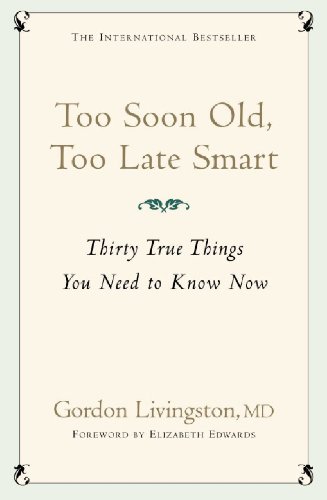
Too old soon, too late smart · Gordon Livingston
Read on October 2019 · How strongly I recommend it: 8/10 · Buy on Amazon
A compendium of 30 life lessons from a psychiatrist who spent decades observing his patients and spotting patterns of thinking and behavior. All too often these lessons are learned the hard way—through regret, disappointment, and suffering—so the younger you learn these, the better your life will be. There’s so much condensed wisdom that it’s impossible to summarize. Even if you only take one insight out of it, it’s worth the read.
“By accepting life and nurturance a child apparently incurs a debt that can be repaid only by meeting parental expectations.“

The Checklist Manifesto · Atul Gawande
Read on July 2019 · How strongly I recommend it: 2/10 · Buy on Amazon
On the effectiveness of using checklists, especially when the situation at hand is very complex and the cost of failure is too high (i.e. surgery, building construction, plane piloting). Checklists make up for our limited memory and knowledge and can act as a reminder at a time when it’s needed. The author establishes that checklists are useful, but fails to offer any theoretical framework or practical approach.
“We adopted mainly a DO-CONFIRM rather than a READ-DO format, to give people greater flexibility in performing their tasks while nonetheless having them stop at key points to confirm that critical steps have not been overlooked.“

Man’s search for meaning · Viktor Frankl
Read on July 2019 · How strongly I recommend it: 8/10 · Buy on Amazon
Classic book from a jew psychiatrist who survived the holocaust. Read it twice. Proof of how habits, love and hope can get you through the most wretched circumstances. Given how deep the subject is, Viktor’s words are so refreshing. My mind often goes back to this book when I need to put things into perspective.
“Those who have a ‘why’ in life, can bear with almost any ‘how’.”

Atomic Habits · James Clear
Read on June 2019 · How strongly I recommend it: 9/10 · Buy on Amazon
The bible of habit building. Massively popular book. A comprehensive guide focused on the fundamentals, rather than tips and tricks (something I always appreciate). I was quite familiar with building habits, but James’ framework helped me make sense of what I was doing. Habits are the building blocks upon which your life is built. Make sure you get them right, as early as possible in life.
Goals are good for setting a direction, systems are best for making progress. The costs of good habits are in the present, the costs of bad habits are in the future. Progress doesn’t happen linearly, but exponentially. Design your environment to support your desired behavior, as willpower won’t suffice. Want to build a new habit? Make it 1. obvious (cue), 2. attractive (craving), 3. easy (response), 4. satisfying (reward). Do the reverse to break a bad one.
“If you want to predict where you’ll end up in life, all you have to do is follow the curve of tiny gains or tiny losses, and see how your daily choices will compound ten or twenty years down the line.”
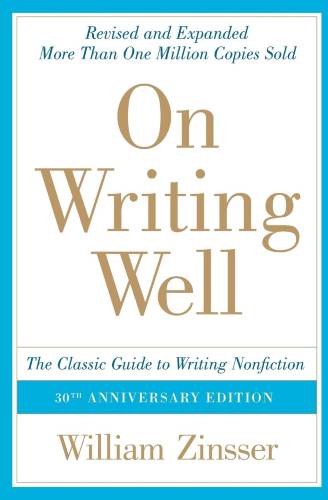
On Writing Well · William Zinsser
Read on June 2019 · How strongly I recommend it: 9/10 · Buy on Amazon
Reading this book marked a pivotal moment in my relationship with writing. It gave me even more respect for the written word, to say the least. It also made me more curious about the shades of meaning of words, in a way that’s almost obsessive. Since then, I feel like I write half as many words and spend twice as much time coming up with them. If that’s something you could tolerate, I highly recommend you this book. It’s a delightful read, with no shortage of useful advice. And witty puns.
Writing is no different than thinking. If I’m serious about a particular text, I’ll start by writing in length and then I’ll be ruthless with the edit, until I end up with a somewhat cohesive text. Then I’ll judge every word, sentence, paragraph… and I’ll keep iterating until I strip my message down to its very essence. I’ll know a text is good when it works both on a granular level and on a structural level, conveying precisely what I want to say.
“Surprisingly often a difficult problem in a sentence can be solved by simply getting rid of it.“
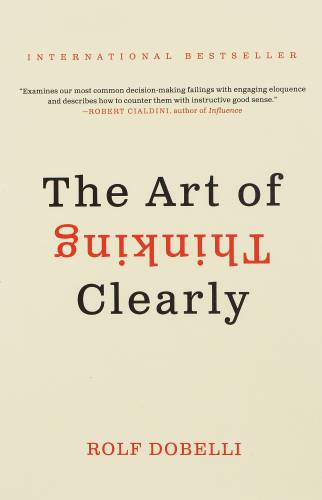
The Art of Thinking Clearly · Rolf Dobelli
Read on June 2019 · How strongly I recommend it: 7/10 · Buy on Amazon
I remember a former boss handed me this book and told me to read it. I tend to be very skeptical when people give recommendations, so I didn’t like to feel forced to read the book without previous research. Surprisingly, it turned out to be a really useful read. A neat collection of common biases, fallacies, and paradoxes. Being aware of them is almost a prerequisite for rational thinking. Our unconscious mind is deeply affected by our evolutionary nature, and we run the risk of making bad decisions because of it. Tons of examples about sunk cost fallacy, confirmation bias, loss aversion, cognitive dissonance, etc. If you don’t know what I’m talking about, do yourself a favor and get the book.
“In situations where the consequences are small, I forget about rational optimization and let my intuition take over. Thinking is tiring. Therefore, if the potential harm is small, don’t rack your brains; such errors won’t do lasting damage. You’ll live better like this.“
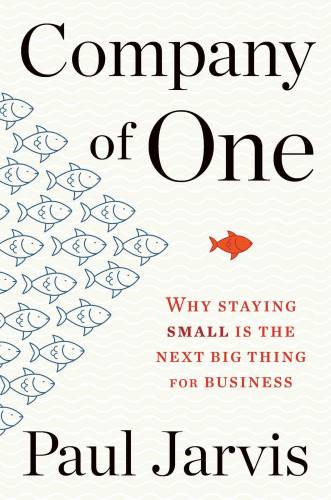
Company of One · Paul Jarvis
Read on May 2019 · How strongly I recommend it: 8/10 · Buy on Amazon
This book helped me reflect on the kind of business I wanted to build for myself. Paul suggests creating a company of one—a business that questions growth as a by-product of success. Make a business that suits your lifestyle, not the other way around. The simpler your business is, the less is needed to keep it afloat, and the more you can focus on delighting your customers through your craft. If your company needs to keep growing to fulfill its mission, be mindful of the implications and make sure you’re not driven by ego. Increasingly relevant concepts as the gig economy grows stronger and stronger. Highly recommended for nerdy, minimalist-type freelancers and entrepreneurs.
“Small can be a long-term plan, not just a stepping stone.“

rEvolución · Román Cendoya
Read on May 2019 · How strongly I recommend it: 4/10 · Buy on Amazon
Only available in Spanish. On the challenges of the upcoming digital era and how profound its impact will be across the board: employment, education, politics, religion… Suggests that the technological revolution will give birth to a new species (Homo Digitalis). A tired topic nowadays, but wasn’t as mainstream around its publication in 2013. Read it a second time to see whether it aged well (it did, fairly well). Clear thinking, blunt writing, and a slight sense of humor peppered in.
“The end of analog society is determined by the time it takes for the biological extinction of today’s individuals.“
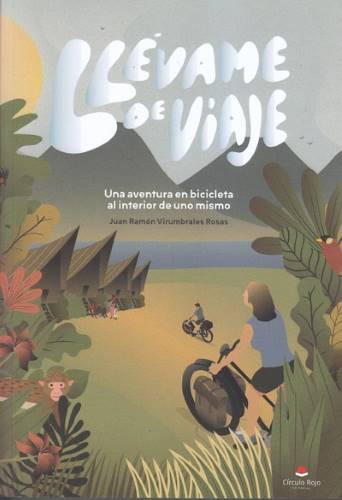
Llévame de viaje · Juan Ramón Virumbrales Rosas
Read on April 2019 · How strongly I recommend it: 7/10 · Buy on Amazon
Only available in Spanish. Though-provoking book from a nomad cyclist, that takes us on a spiritual journey in the context of Indonesia. Very critical of the pace, excess, and contradictions of modern life: materialism, comfort, hedonism, narcissism, hypocrisy, work-life, education, and healthcare systems… The solution: reconnect with the self, surrender the ego, follow your passion, think for yourself, embrace uncertainty, reconnect with nature, live with little means, help others selflessly. A bit idealistic maybe, but highlights many crucial points. I found it very inspiring at the time.
“You have not chosen all the garbage that you carry in your unconscious.“
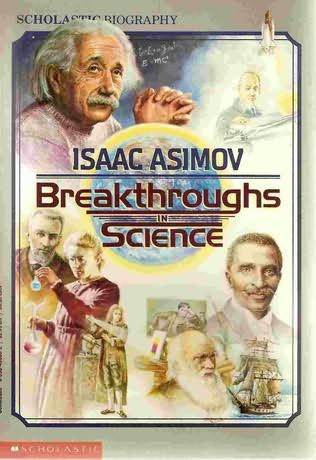
Breakthroughs in Science · Isaac Asimov
Read on April 2019 · How strongly I recommend it: 7/10 · Buy on Amazon
An informative yet very entertaining read. It’s a collection of 20+ biographies of scientists and inventors whose breakthroughs shaped the way we conceive and interact with the world. Inevitably increased my interest in science and my respect for innovators. Fascinating to see how almost all of them faced strong opposition, or how frequently they didn’t fit in in classic school or work settings. While these days thinking outside the box is increasingly encouraged, only a couple hundred years ago it was heavily penalized, leading to ostracism or even death penalty. We have to be so grateful that we were born in this time of history.
“A soldier ordered Archimedes to surrender, but he paid no attention. The problem was more important to him than a little thing like the sack of a city. “Don’t disturb my circles,” said Archimedes. So the soldier killed him.“

Expedición Cabo Norte · Anina Anyway & Pablo Calvo
Read on March 2019 · How strongly I recommend it: 7/10 · Buy on Amazon
Only available in Spanish. Very well written. The authors happened to give a talk in my city and I had the opportunity to spend some hours with them. I remember being very inspired by their experience, having traveled by bike from Spain to Norway.
The book made me feel as though I was part of their story: pedaling, meeting strangers, sharing meals, sleeping in a tent, getting lost, getting hurt… There are tons of wise analogies on how their physical journey represents life itself.
“There is no better criteria for deciding what to leave behind than an uphill climb.“
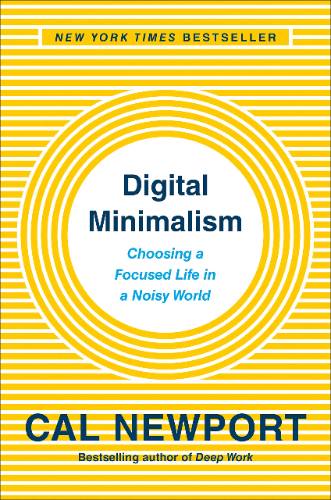
Digital Minimalism · Cal Newport
Read on February 2019 · How strongly I recommend it: 8/10 · Buy on Amazon
By the time I launched this website in February 2019, my original idea was to create a blog on the intersection of minimalism and digital technology. This book was published right around that time, so I was very excited about it. Plus, it was the first book I picked up after buying my Kindle.
With the advent of social media, remote work, and infinite distractions at our fingertips, this is a topic that people cannot take seriously enough. It’s critical to understand how the attention economy works and learn how to use technology more mindfully. More and more people fall prey to the dark side of digital technology, not only resulting in lower productivity but with deeply pernicious effects on our mental health, our relationships, and the way we perceive the world. Cal is in a good position to talk about this, being a prolific author, college professor, a computer engineer who happened to never sign up on any social media.
“More often than not, the cumulative cost of the noncrucial things we clutter our lives with can far outweigh the small benefits each individual piece of clutter promises.“